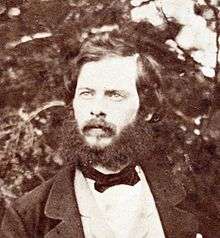Theodore Winthrop
| Theodore Winthrop | |
|---|---|
 | |
|
| |
| Signature |
|
Theodore Winthrop (September 22, 1828 – June 10, 1861) was a writer, lawyer, and world traveller. He was one of the first Union officers killed in the American Civil War.
Biography
Winthrop was born in New Haven, Connecticut. He was descended through his father from Governor John Winthrop and through his mother from Jonathan Edwards. An 1848 graduate of Yale University, he travelled for a year in Great Britain and Europe and then through the United States. After contributing to periodicals, short sketches, and stories, which attracted little attention, Winthrop enlisted in the 7th Regiment, New York State Militia, an early volunteer unit of the Federal Army that answered President Abraham Lincoln's call for troops in 1861. He wrote a popular essay about the experience titled "Our March to Washington." He was appointed Major and soon became an aide-de-camp to Maj. Gen. Benjamin Butler, commander of the Department of Virginia headquartered at Fort Monroe.
Battle of Big Bethel
At the Battle of Big Bethel on June 10, 1861, he volunteered for General Ebenezer W. Peirce's staff and drew up a crude plan of battle. After a Federal attack to the enemy right flank was foiled, Winthrop led an ill-fated assault on the Confederate left held by four companies of the 1st Regiment North Carolina Infantry, under the command of Colonel (later Lieutenant General) Daniel Harvey Hill.
In the heat of battle, Major Winthrop leapt onto the trunk of a fallen tree and reportedly yelled, "One more charge boys, and the day is ours." Soon thereafter, he was killed by a musket ball to the heart and became the first casualty of rank for the Northern side in what history regards as the first pitched land battle of the Civil War. Ironically, ardent abolitionist Winthrop may have been shot by the African-American slave of a Confederate officer in the 1st North Carolina Infantry. (Three different soldiers, as well as this slave, referred to in the records only as "Sam," claimed to have killed him.)
Author
Winthrop's novels, for which he had failed to find a publisher during his lifetime, appeared posthumously. They include John Brent, founded on his experiences in the far West, and Edwin Brothertoft, a story of the American Revolution. Cecil Dreeme, his most important work, was a semi-autobiographical novel dealing with social mores and gender roles set at New York University, where Winthrop had once been a lodger. Other works include The Canoe and the Saddle and Life in the Open Air. His sister, Laura Winthrop Johnson, assembled a collection of his poems and prose organized by the time period of his life Life and Poems of Theodore Winthrop.
See also
External links
| Wikimedia Commons has media related to Theodore Winthrop. |
| Wikisource has original works written by or about: Theodore Winthrop |
- NYU and the Village: Theodore Winthrop
- Life and Poems of Theodore Winthrop
- Guide to the Theodore Winthrop papers
- Works by Theodore Winthrop at Project Gutenberg
- Works by or about Theodore Winthrop at Internet Archive
![]() This article incorporates text from a publication now in the public domain: Cousin, John William (1910). A Short Biographical Dictionary of English Literature. London: J. M. Dent & Sons. Wikisource
This article incorporates text from a publication now in the public domain: Cousin, John William (1910). A Short Biographical Dictionary of English Literature. London: J. M. Dent & Sons. Wikisource